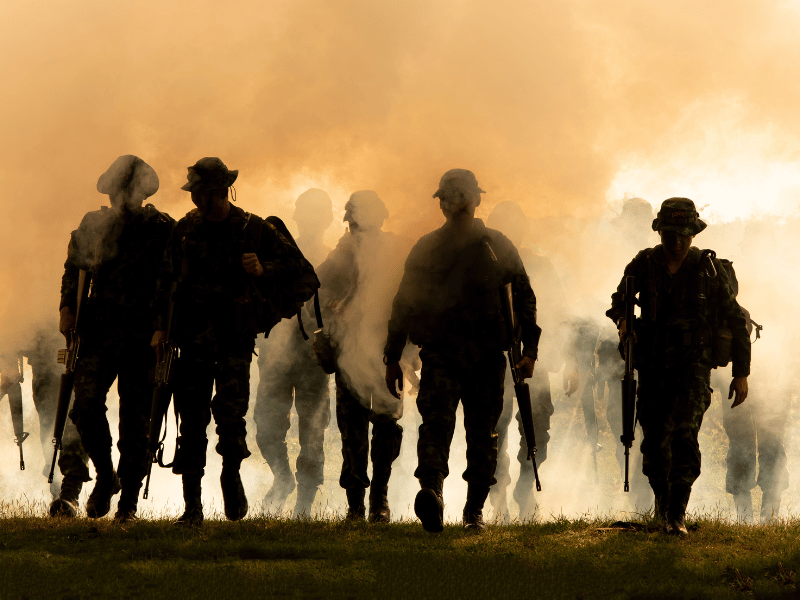


War and conflict are always devastating topics of discussion. It brings about a strong sense of pain and emotional turmoil. So, what happens when you have dreams about war? In this article, we’ll explore what it means to dream about war, common war dream meanings, and its psychological significance.

War dreams often carry deep symbolic meanings, reflecting personal, emotional, and psychological struggles. Here are the most common themes associated with dreams about war:
War in dreams often represents an internal battle between opposing emotions, beliefs, or desires. It may signal unresolved personal conflicts, such as guilt, self-doubt, or difficult decisions weighing on your mind.
Dreams of war frequently occur during periods of high stress, uncertainty, or overwhelming responsibilities. The chaotic nature of war mirrors the emotional stress or turbulence you may be experiencing in your waking life.
Engaging in war can symbolize conflicts in relationships, work, or personal matters where power dynamics and control are at play. It may reflect struggles with authority, competition, or personal boundaries.
The destruction and violence associated with war may signify a fear of losing something important—whether it be relationships, security, or a familiar way of life. War dreams can also represent major life transitions that feel challenging or unpredictable.
If your dream involves fighting or surviving in a war, it may symbolize your ability to endure hardships and persist through difficulties. It reflects resilience and determination to overcome obstacles.
War dreams may also stem from exposure to current events, societal conflicts, or collective fears. They can reflect anxieties about political instability, global crises, or feelings of powerlessness in the face of larger issues.
War dreams can manifest in various ways, each carrying different symbolic meanings based on the context and emotions within the dream. Here are some of the most common scenarios and what they may represent:

This dream suggests you are facing a significant struggle or conflict in your waking life. It may indicate stress, competition, or the need to defend your beliefs and values against opposing forces.
Observing a war from a distance can symbolize feelings of helplessness, anxiety, or uncertainty about external events in your life. It may reflect a situation where you feel unable to control or influence the outcome.
Dreams of losing a battle may indicate personal failure, self-doubt, or struggles with inner conflicts. It suggests that you may be feeling overwhelmed by challenges and in need of a new strategy or perspective.

Victory in a war dream symbolizes overcoming obstacles, gaining confidence, and finding solutions to conflicts. It reflects resilience and the ability to navigate difficulties successfully.
If war erupts unexpectedly in your dream, it may reflect sudden emotional turmoil, arguments, or conflicts in your waking life. It signals unresolved issues that require immediate attention.

Taking cover or escaping war suggests avoidance of confrontation, emotional withdrawal, or fear of facing difficult challenges. It may indicate a need for security and emotional protection.
Dreams where family members or friends are involved in war can symbolize worries about their well-being, unresolved conflicts, or concerns about their emotional struggles.
You may like: What Does it Mean When You Dream About Getting Shot?
Dreams about war are not as rare as one might assume, especially among populations affected by conflict or those with exposure to war-related media happening across the world. Studies have shown a significant prevalence of these dreams in various groups:
These statistics underscore the profound psychological impact of war, not only on those directly involved in conflict but also on civilians living in affected areas. The persistence of these dreams over time further emphasizes the deep-rooted nature of war-related trauma in the human psyche.
Explore more: What Does It Mean If You Cry In A Dream?
War dreams hold different meanings across cultures, shaped by historical events, religious beliefs, and societal values. While some cultures view them as warnings, others see them as reflections of personal or collective struggles.
Here are four key cultural interpretations of war-related dreams:
In Western societies, war dreams are often linked to psychological stress, personal struggles, or past trauma. Given the impact of global conflicts and media exposure, these dreams may reflect deep-seated fears, unresolved anxieties, or feelings of instability.
In Eastern traditions, war in dreams often represents an internal struggle between opposing forces. Taoism interprets it as a sign of imbalance between yin and yang, while Buddhism sees it as a battle with attachment, ego, or karma. These dreams may signal a need for inner peace, personal growth, or spiritual awakening.
Many Indigenous cultures believe war dreams carry messages from ancestors or spirits. They may serve as warnings, preparations for personal challenges, or calls to protect one’s community. In Native American traditions, such dreams are sometimes viewed as visions, guiding the dreamer toward strength and wisdom.
War dreams are rich with symbolic meanings, providing a glimpse into the dreamer’s emotional and mental state. Here are some key interpretations through psychological lenses:
From a psychodynamic viewpoint, war dreams reveal inner struggles and hidden desires. They may symbolize suppressed aggression, fear, or personal feelings of helplessness. These dreams act as a safe space for the subconscious mind to process these emotions, offering an opportunity to confront and address them in a controlled environment [4].
War-related dreams can also be seen as the mind’s way of processing emotions and resolving psychological stress. They often occur during times of heightened anxiety, serving as a mechanism for working through burdensome feelings or emotional conflicts. For some, these dreams might even help clarify difficult decisions or reframe personal challenges in the real world [5].
A study among Ukrainian university students during the Russian invasion found that 86% reported experiencing war-related nightmares [3]. These dreams are often linked to symptoms of PTSD, insomnia, and other mental health issues, highlighting their substantial impact on overall well-being. This suggests that war dreams, particularly in individuals affected by trauma or conflict, can be a reflection of deep psychological distress and unresolved fears.
See also: What Does it Mean When You Dream About Zombies?
A dream about war is far more than just a chaotic vision—it’s a powerful reflection of the subconscious mind, symbolizing inner conflicts, emotional struggles, and the ongoing battle to navigate life’s challenges. Whether triggered by your experiences, external influences, or psychological stress, these dreams offer an opportunity to gain deeper insights into your emotional state and work toward resolution and growth.
Discover more dream meanings and interpretations on the ShutEye® app. ShutEye® is a curated sleep-tracking app that not only monitors your sleep habits but also has an artificial intelligence tool that analyzes your dreams.
Caviglia G. (2021). Working on dreams, from neuroscience to psychotherapy. PMC [online] Available at: https://pmc.ncbi.nlm.nih.gov/articles/PMC8451212
Kaźmierczak, I., Zajenkowska, A., Bodecka-Zych, M. et al. (2023). Exploring the emotional and thematic matrix of dreams during war: the role of anxiety and depression. Springer [online] Available at: https://doi.org/10.1007/s12144-023-05339-w
Pavlova, I., & Rogowska, A. M. (2023). Exposure to war, war nightmares, insomnia, and war-related posttraumatic stress disorder: A network analysis among university students during the war in Ukraine. ScienceDirect [online] Available at: https://www.sciencedirect.com/science/article/pii/S0165032723011308
Sandman, N., Valli, K., Kronholm, E., Ollila, H. M., Revonsuo, A., & Laatikainen, T. (2013). Nightmares: Prevalence among the Finnish General Adult Population and War Veterans during 1972-2007. PMC [online] Available at: https://pmc.ncbi.nlm.nih.gov/articles/PMC3669062
Schultz, J.-H., Forsberg, J. T., Harb, G., & Alisic, E. (2021) Prevalence and Characteristics of Posttraumatic Nightmares in War- and Conflict-Affected Students. PMC [online] Available at: https://pmc.ncbi.nlm.nih.gov/articles/PMC7989377

